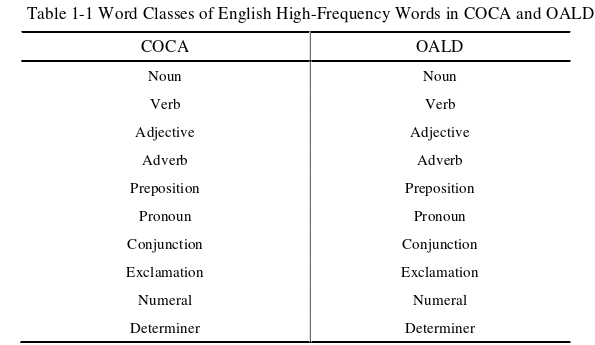联系方式
more本类最新英语论文
- 2024-04-18基于cbi的初中英语语法教学..
- 2024-04-07教师反馈与同伴反馈结合模式..
- 2023-12-10多模态教学模式应用于欠发达..
- 2023-11-30句法-语篇界面视角下中国英..
- 2023-11-19句法-语篇界面视角下中国英..
- 2023-11-05英汉散射型虚拟位移表达的比..
- 2023-11-03基于语料库的英汉词类原型范..
- 2023-10-11“跑np”构式的句法语义探讨
- 2023-06-11英语一级情态动词can和may语..
- 2023-04-28基于语料库的need和dare去语..
more热门文章
- 2010-03-11the use of conditional se..
- 2009-08-08英语语法论文:名词化的生成..
- 2009-08-08英语语法论文:英语不定式和..
- 2009-08-16对比研究运算效率与英汉双及..
- 2009-08-07英语论文:汉英动宾结构比较..
- 2009-08-16研究英汉单位词语用搭配对比..
- 2010-06-11 the comparison between c..
- 2010-05-30英语语素与音位、义素的联系
- 2009-08-16探究虚拟式中should的功能
- 2009-11-05引导的条件从句用法归纳if
more留学论文写作指导
- 2024-03-31卡森•麦卡勒斯小说中..
- 2024-03-28美国黑人女性心理创伤思考—..
- 2024-03-27乔治·艾略特《织工马南》中..
- 2024-03-21超越凝视:论《看不见的人》..
- 2024-03-19《哈克贝利•费恩历险..
- 2024-03-13心灵救赎之旅——从凯利的三..
- 2024-02-22文学地理学视角下的《印度之..
- 2023-05-03英、汉名词短语之形容词修饰..
- 2023-02-07目的论视域下5g—the futur..
- 2022-07-04二语英语和三语日语学习者的..
基于语料库的英汉词类原型范畴探究
论文作者:留学生论文论文属性:硕士毕业论文 thesis登出时间:2023-11-03编辑:vicky点击率:374
论文字数:56966论文编号:org202310271041212112语种:英语 English地区:中国价格:$ 66
摘要:本文是一篇英语语法论文,本研究进一步发现英汉词类范畴具有相似的原型效应,以高实体性和能产性的名词为原型逐渐向形容词/动词、副词以及其他封闭词类拓展,形成一个原型-边缘连续统。但英语形容词和叹词比汉语具有较高的使用频率,导致其在各自语言词类范畴中的地位有所差异。
本文是一篇英语语法论文,笔者认为坚持以使用为基础语言观,以高频词为主要观察对象,本文旨在探究英汉词类范畴的特点,以期从类型学角度充实词类的认知研究。
Chapter One Introduction
1.1 Research Background

The study of word classes is the basis of grammar research in both English and Chinese. Palmer (1971), while rejecting the division of word classes in early grammar studies, recognizes the importance of word classes in linguistics. From past studies, it is not difficult to find that there have been divergences in word classes. In the pursuit of a precise and perfect word-class system, the study of word classes should not be limited to theory but focus on application, looking for a usage-based interpretation of word classes. Nowadays, the study of language from a cognitive perspective has become a major direction in linguistic research, which offers new approaches to the study of word classes.
Cognitive linguistics regards word classes as categories based on prototype theory (Hopper & Thompson, 1984; Bhat, 1994; Croft, 2001; Taylor, 2001; Cacoullos, 2002), which treats the relation between word classes as the relationship between categories. Yuan (1995) has also given a system of Chinese word-class categories based on prototype theory, but Zhao and Wang (2008) argue that this view of prototypical categories is not scientific on the basis of the psychology of subjectivity. In particular, the degree of prototype or typicality should reflect the differences in members within the same category rather than the distinction between categories. The previous analyses of word-class prototypicality are dominated mainly by semantic features without due attention to their usage-based situations. Therefore, it is necessary to organically combine the prototypical analysis of semantic categories with the usage-based context. Following cases like “fine” and 通 show their multiple word classes as their usages vary.
1.2 Research Contents
This current research, exploiting the high-frequency word lists compiled from the English and Chinese corpora, mainly investigates the word classes of high-frequency words in English and Chinese from the perspective of cognitive semantics. The usage-based principle of cognitive linguistics is followed to systematically and comprehensively observe and describe the distributions and cognitive tendencies of these word classes. Then, from a cognitive perspective, combined with conceptual space theory (Gärdenfors, 2014), the prototypicality of word classes is analyzed in depth. Moreover, comparing the prototype characteristics of the word-class category in English and Chinese, the thesis summarizes the cognitive mechanisms of the word-class extensions. At the same time, with the essential characteristics of word classes in English and Chinese explained, the cognitive differences behind the use of word classes are to be revealed in the two nations. Specifically, the following questions will be addressed:
(1) What are the cognitive prototype effects of English and Chinese word classes?
(2) What are the cognitive typological groundings for English and Chinese word-class prototypicality and extensions?
Language reflects empirical reality, and as language communities live in different physical and social backgrounds, the prototypes of word classes must be different. On th本论文由英语论文网提供整理,提供论文代写,英语论文代写,代写论文,代写英语论文,代写留学生论文,代写英文论文,留学生论文代写相关核心关键词搜索。

 英国
英国 澳大利亚
澳大利亚 美国
美国 加拿大
加拿大 新西兰
新西兰 新加坡
新加坡 香港
香港 日本
日本 韩国
韩国 法国
法国 德国
德国 爱尔兰
爱尔兰 瑞士
瑞士 荷兰
荷兰 俄罗斯
俄罗斯 西班牙
西班牙 马来西亚
马来西亚 南非
南非






